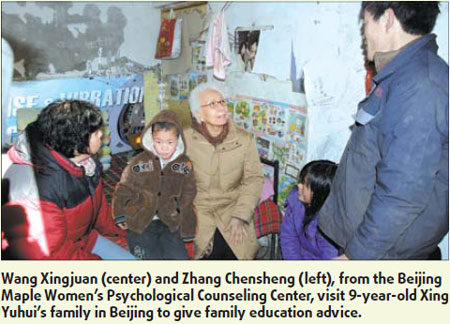Care and education begins at home

Two years ago, Wang Xingjuan, an expert on women issues in her late 70s, read a news story saying that migrant groups occupy about 23 percent of Beijing's total population of 15.38 million. Migrant parents gave birth to 56,000 babies in 2005, which was six times more than it had been a decade ago.
"A foreign counseling institution estimates that half of China's city residents will be rural immigrants by 2020. A population of new citizens is surprising," says Wang. She founded the Maple Women's Psychological Counseling Center 20 years ago.
She notes that society pays a lot of attention to migrant children today. The priorities are whether they have a school and whether they will be trained to get a job in the city. However, a picture is missing here: Family education.















